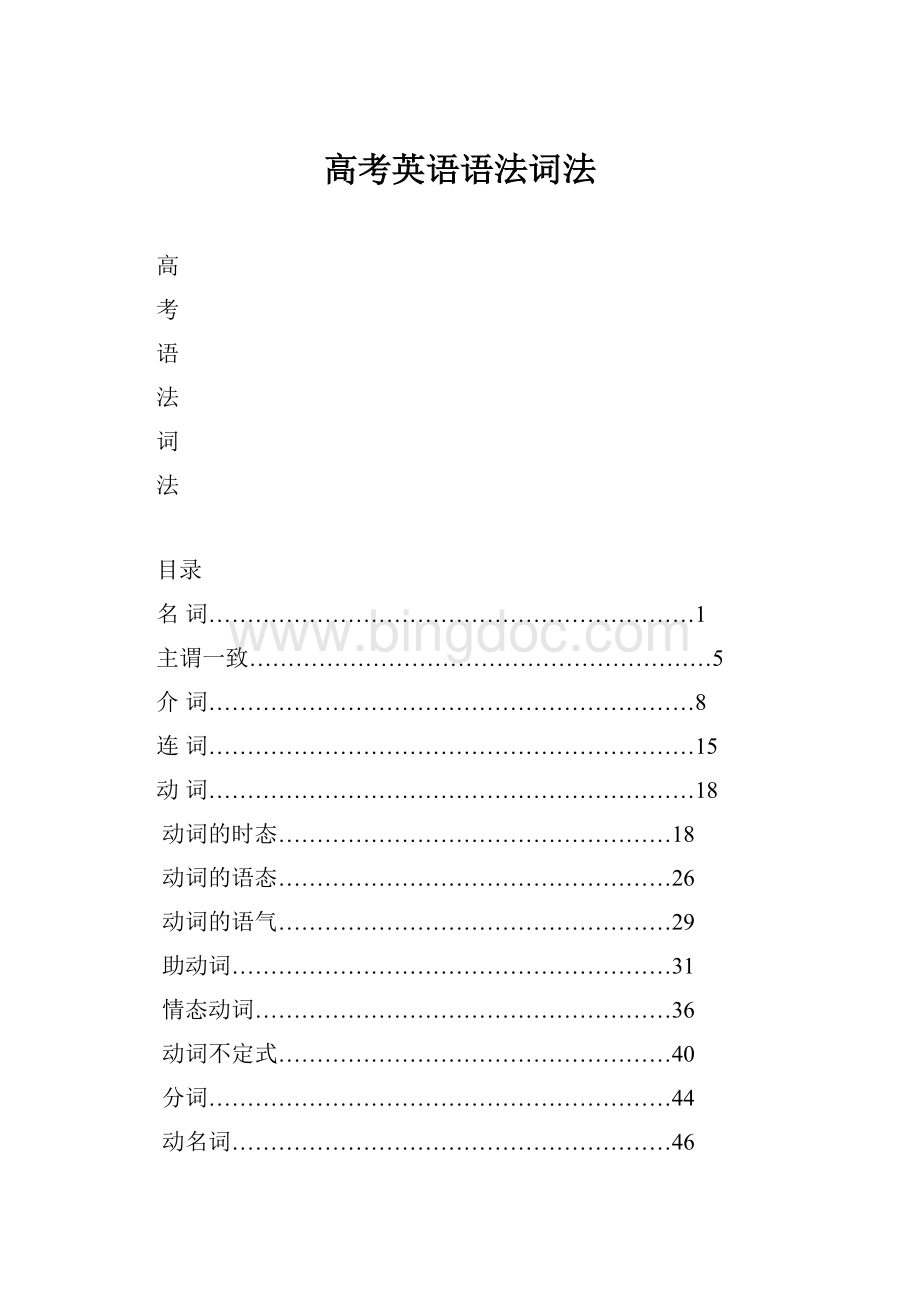高考英语语法词法.docx
《高考英语语法词法.docx》由会员分享,可在线阅读,更多相关《高考英语语法词法.docx(93页珍藏版)》请在冰点文库上搜索。

高考英语语法词法
高
考
语
法
词
法
目录
名词………………………………………………………1
主谓一致……………………………………………………5
介词………………………………………………………8
连词………………………………………………………15
动词………………………………………………………18
动词的时态……………………………………………18
动词的语态……………………………………………26
动词的语气……………………………………………29
助动词…………………………………………………31
情态动词………………………………………………36
动词不定式……………………………………………40
分词……………………………………………………44
动名词…………………………………………………46
形容词和副词……………………………………………48
代词………………………………………………………55
数词………………………………………………………61
冠词………………………………………………………62
构词法……………………………………………………63
名词
在高考英语试题中对名词的考查主要有:
1.名词的单复数问题;
2.不可数名词的性质;
3.名词作定语的用法(名词的普通格与所有格);
4.名词的辨析等。
一、名词的单复数问题
1.以下限定词修饰可数名词的复数:
both,all,these,those,oneof,(a)few,quiteafew,several,agreatnumberof,agreatmany,many,different,allkindsof大于或等于2的基数词等。
2.以下限定词修饰可数名词的单数:
this,that,theonly,thesame,sucha/an,manya/an,one,either,neither,every,each, 序数词等。
3.以下限定词修饰不可数名词:
(a)little,much,agreatdealof,alargeamountof,quitealittle,onlyalittle,alargequantityof等。
4.中性的限定词:
some,none,alotof,lotsof,plentyof,,等。
但是,agreatdeal/alot均为程度副词,修饰行为动词。
例如:
Ihave learntalot fromyourspeech,andyouradviceofferedme agreatdealofhelp.
5.可数名词单、复数变化形式
(1)规则变化。
①单数名词词尾直接加-s。
如:
boy—boys,pen—pens。
②以s、x、ch、sh结尾的单词一般加-es。
如:
box—boxes,brush—brushes。
特例:
stomachs。
③以“辅音字母+y”结尾的变“y”为“i”再加“-es”。
如:
baby—babies,lady—ladies
④以“o”结尾的多数加-es。
如:
tomato— tomatoes, potato— potatoes,hero— heroes,
heroes。
(可记忆为:
黑人英雄爱吃土豆)。
但以两个元音字母结尾的名词和部分外来词中以o结尾的词只加-s。
如:
radio— radios,zoo— zoos,photo— photos,piano— pianos,kilo— kilos,tobacco—tobaccos。
⑤以“f”或“fe”结尾的名词复数形式变“f”或“fe”为“v”,之后再加-es。
如:
wife—wives,life—lives,knife—knives,wolf—wolves,self—selves,leaf—leaves,thief—thieves等。
(可记忆为:
为了自己活命,小偷和他的妻子手里拿着刀子和几片树叶站在架子上把狼劈成两半。
)
特例:
handkerchief—handkerchiefs,roof—roofs,chief—chiefs,gulf—gulfs,belief—beliefs,cliff—cliffs。
⑥改变元音字母的。
如:
man—men,mouse—mice,foot—feet,woman—women,tooth—teeth,goose—geese,ox—oxen。
特例:
child—children。
⑦复合名词的复数形式。
(A)在复合词中最后名词尾加-s。
如:
armchair—armchairs,bookcase—bookcases,bookstore—book-stores。
(B)man和woman作定语修饰另一个名词时,前后两个名词都要变成复数。
如:
mandoctor— mendoctors,womandriver— womendrivers。
(C)与介词或副词一起构成的复合名词应在主体名词部分加-s。
如:
brother-in-law— brothers-in-law,passer-by— passers-by。
⑧有的名词有两种复数形式。
如:
zero—zeros/zeroes,deer—deers/deer。
penny的两种复数形式含义有所不同。
如:
pence(便士的钱数),pennies(便士的枚数)。
(2)不规则变化。
①单、复数同形。
如:
means,aircraft,deer,fish,Chinese,Japanese,sheep,works(工厂),cattle。
②合成名词的复数。
如:
boy-friend—boy-friends,grown-up—grown-ups。
③有些名词通常只用作复数。
如:
glasses眼镜,clothes衣服,goods货物,trousers裤子,belongings所有物,wages工资,riches财富,surroundings环境,ashes灰尘,compasses圆规,cattle家畜,congratulations祝贺,havewordswithsb.同某人吵架,inhighspirits以很高热情地,giveone’sregardstosb.向某人问候,inrags衣衫破烂,Itisgoodmannerstodosth.有礼貌做某事。
④集体名词的数。
有些集体名词通常只用作复数,如:
people,cattle,police;
有些名词只用作单数,如:
machinery,furniture,mankind,jewellery;
有些名词既可用作单数又可用作复数,单数看作整体,复数看作集体的各个成员。
如:
Thecrew is large.船员人数很多(指整体);Thecrew are alltired.船员们都累坏了(个体)。
6.几个容易误用的名词的单复数:
单复数相同:
sheep,deer,fish,Chinese,Japanese,means)
只有复数:
cattle,people
常以复数形式出现:
trousers,glasses,thanks,clothes,remains(遗物),contents,goods,congratulations,means,sports,preparations(准备),tears,repairs,regards,games(运动会))
以s结尾的学科或专有名词常作单数:
politics,maths,physics,theUnitedStates,TheUnitedNations
7.几组易错名词的用法:
manya+单数名词=many+复数名词
集合名词:
family,team,audience,enemy,public,group,class,government,company,police,party作主语时,若看作一个整体时,谓语动词用单数;若表示组成分子,则用复数
e.g.Thepoliceareondutyatthestreetcorner.
Myfamilyis/aregoingtohavealongjourney.
population:
1)作为“人口”的总称或“居民”的总数是不可数名词,谓语用单数。
2)问“多少人口”时,不说howmany或howmuch,而用what。
3)在谈到“人口比„„多”时,常用large,great;“人口少”时,常用small,而不用much,many或little。
4)当谈及“有„人口”时,习惯上用haveapopulationof„。
5)当“百分数/分数+ofthepopulation”作主语时,谓语用复数。
6)表示某个地区人口时,其前应有定冠词。
7)population不能与people连用。
e.g.ThepopulationinChinaisverylarge,and80%ofthepopulationarefarmers.Thecityhasapopulationofthemillion.
8.表示“许多”的词组:
代替many,修饰可数名词的有:
agreatnumberof,alargenumberof,agoodnumberof,agreatmany,manya
代替much,修饰不可数名词的有:
agreatdealof
既可修饰可数名词又可修饰不可数名词的有:
alotof,lotsof,plentyof,alarge/great/goodquantityof,largequantitiesof
e.g.Theteachergaveusalargenumberofexamples.
9.名词前多个形容词的排列顺序:
描绘性+大小/新旧/年龄/温度/形式+颜色/形状+起源/出处+材料/目的分类(县官行令色国才)
e.g.aprettylittleAmericangirlanoldstonebridge
asmallroundpinetablethedirtyoldgreencoat
二、.不可数名词的性质:
一般来说,液体名词、气体名词、材料名词、抽象名词、物质名词、语言名词、信息名词、抽象名词、心态名词等都是不可数名词。
不可数名词具体有以下五大性质:
1.前无不定冠词修饰;
2.后无复数变化;
3.常用it指代;
4.作主语时其谓语常用单数形式;
5.复数形式需通过量词的变化来体现。
要特别注意抽象名词具体化:
Failure isthemotherof success.Tomis asuccess atmaths,but afailure insports.
Weusuallyhave lunch atschool,buttodaywewillhave awonderfullunch atMcDonald.
Aplaceofinterest—Therearealotofplacesofinterestinmyhometown.
三、名词作定语的用法
1.名词的普通格:
名词作定语一般用单数形式。
例如:
Therearealotofshoeshopsinthestreet.Butthereisonlyone jewelleryshop init.
但是,如果man或woman作定语时,则与被修饰的名词保持人称与数的一致。
例如:
Thereisonly onemanhead teacherinourgrade,butfive womenheadteachers init.
2.所有格:
包括有生命的所有格与没有生命的所有格。
1).有生命的所有格用’s结构,但是s结尾的名词及s结尾的复数名词只用后加’。
例如:
Marxwashappytoreceive Engels’ moneyandthankedhimforhisimportanthelp.
Wesentourteacherssomecardsfor theTeachers’Day.
2).无生命的所有格常用of结构。
例如:
Wefindasmallholeinthecorner ofthefrontdoor.
3)双重所有格:
限定词+名词+of+名词性物主代词/名词’s:
Tom isafriendofmine/Kate’s.
四、名词辨析主要考查同学们对相似的名词词义的辨析和包含名词的常用习惯搭配.
另外,高考中还考过的名词短语有:
1.dosbafavor; givesb.anoffer;
themostpopularchoice;
2.beofgreatvalue; haveawordwithsb;
at…price; havenochoicebuttodosth;
3.put…into
4.practice; haveaneffecton;
havealittlepatience; leaveamessageforsb;
5.otherformsof
6.actionspeakslouderthanwords; comeintoeffect;
beinuse; makeuseof;
7.lookintothematter;playanimportantpart/rolein
主谓一致
英语句子中谓语动词的数必须与主语的人称和数取得一致,这就叫做主谓一致。
解决主谓一致主要遵循三个原则:
语法一致原则、意义一致原则和就近一致原则。
1.either,neither,each,one,theother,another,anybody,anyone,anything,somebody,someone,something,everything,everybody,everyone,no,one,nothing,nobody
做主语时,谓语一般用单数。
Neitherofthetwosentencesiscorrect.
Everythingaroundusismatter.
(注意:
none,neither,all,any作主语时,谓语可用单数,也可用复数,具体取决于说话人的意思。
)
Noneofthemowns/ownacar.
Neitheroftheboysare/isinterestedingeography.
Allarehere.Andallthatcanbedonehasbeendone.
2.表示“时间、距离、金额、重量、面积、体积、容积”等度量的名词做主语时,谓语用单数。
Fiveminutesisenough.
Fourhundredfrancsisalotofmoney.
3.each…andeach…,every…andevery;no…andno;manya…andmanya…等结构由于强调个体行为,因此谓语动词使用单数。
EachboyandeachgirlhasgotanewEnglish-Chinesedictionary.
Nosoundandnovoiceisheardforalongtime.
4.从句、不定式、动名词或短语作主语时谓语动词使用单数形式。
Tosaysomethingisonething,todoitisanother.(tosaysomething,todo是不定式)
“Howdoyoudo?
”isnotaquestionbutagreeting.(Howdoyoudo?
是句子,作主语)
(注意:
what引导主语从句时应注意其所指的具体内容来确定谓语的单复数。
)
Whatweneedismoretime,whilewhattheyneedaremoredoctorsandmedicines.
5.oneandahalf后面带名词的复数,谓语动词常用单数。
Oneandhalfbananasisleftonthetable.
6.用and连接的两个名词表示单一概念时谓语动词使用单数。
TheheadmasterandPartysecretaryisgoingabroadnextmonth.
Breadandbutterismyusualbreakfast.
7.有些名词呈复数形式,但并不表示复数概念。
Thenewsisdisappointingthatachemicalworksistobebuiltinthewestofthecity.
8.名词由and或both…and连接主语时,谓语动词使用复数形式。
Bothcoffeeandbeerareonsaleintheshop.
9.people,public,police,cattle做主语时,谓语动词习惯上使用复数。
Thepolicehavecaughtthemurderer.Andpeoplearetalkingaboutthenews.
10.表示成双、成套的名词作主语时,谓语动词使用复数。
Yourtrousersaretoolong,buttheseshoesfityouquitewell.
但有apairof连接时,谓语动词使用单数。
Apairofglovesisanicepresentforher.
11.不可数名词作主语,但前面有表示数量的复数名词修饰时,谓语动词用复数。
Threemilliontonsofoilareexploitedeveryyearintheoilfield.
12.在or,either…or…,neither…nor…,notonly…butalso…,not…but…,therebe等结构中,采取就近原则,即谓语动词使用单数还是复数取决于最靠近的主语的单复数。
Eithertheteacherorthestudentsaretoblame.
Notonlythestudentsbutalsotheirteacherisenjoyingthefilm.
13.下列结构用于引起一个附加的成分,谓语动词的形式应不受附加成分的影响而于前面的主语取得一致:
aswellas;ratherthan;like;except;besides;with;alongwith;including;such…as…;;
NoonebutJackandMaryknowsaboutit.
Iaswellastheyamreadytohelpyou.
14.someof;plentyof;alotof;mostof;therestof;all(of);half(of);分数或百分之+of+名词做主语时,以名词的单复数为准。
Alotofstudentsarewaitingoutside.Andlotsofthetimehasbeenwasted.
Morethan70%oftheearth’ssurfaceiscoveredbywater.
Tenpercentoftheapplesarebad.
Therestofthestoryneedsnotelling.
Hestayedathomeandtherestoftheboyswereoutatplay.
15.由akindof;thiskindof;manykindsof和名词+ofthiskind等以及与kind意思相近的type,sort等构成的类似的短语做主语时,谓语动词与of前的名词取得一致。
ThiskindofapplesellswellinChina.
Applesofthiskindarehighlypriced.
16.morethan开头的句子,看其后面的名词。
Morethanoneansweriswrittenontheblackboard.
Morethantwohundredsoldierswerekilledinthebattle.
17.定语从句中谓语动词的形式与先行词一致,但oneof+复数名词+who/that/which引导的定语从句的谓语动词的形式看one的前面是否有the(only)等修饰语,有为单数,无为复数。
Thisisoneofthebestbooksthathaveappearedthisyear.
Sheistheonlyoneofthosewomenwhodoesn’tknowathingaboutknitting(编织).
18.population;company;class.team;family;group;nation;world;government等词做主语时,如果强调整体,谓语动词使用单数;如果强调组成成员,谓语动词使用复数。
Ourfamilyhasareunioneveryyear.
Hisfamilyarewaitingforhim.
19.the+形容词,表示一类人,谓语动词用复数;若指单数,则用单数谓语动词。
Thericharefortheplan,butthepoorareagainstit.
Thetrueistobedistinguished